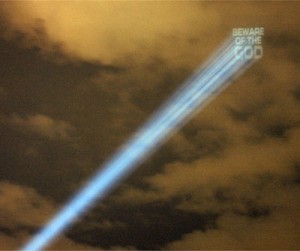Australian art practice addressing global issues: environmental, social and political Aside from a huge array of inventions, the American inventor and visionary Buckminster Fuller wrote many books including Operating Manual For Spaceship Earth, which in 1963 re-imagined earth as a spaceship flying through space with a finite amount of resources that cannot be resupplied. Such consideration of our global energy consumption and technology choices is even more deeply needed today, with mass scale environmental disasters and current social, cultural, and political climate.
In this era of sophisticated, technologically enhanced art making, it would seem crucial that artists’ consider the impact of their technologies, processes and possible meanings in relation to the larger questions of our century. Which isn’t to say we need any more art-manifestoes either, but hopefully this scan of strategies employed by Australian artists can illuminate some of the saner pathways available for addressing environmental problems and voicing a social conscience.
Steering Technology
Confronting the actuality and implications of climate-change and species extinction can leave many feeling hopeless, lethargic, and nihilistic. Or it can provide a foundation for action – such as with Combat Wombat, a group of hyper-energised hip-hop musicians.
As well as juggling a successful hip-hop career with lyrics that interrogate Australia’s uranium mining, Combat Wombat also set an excellent energy-conscious example. Their last album (Unsound System, available through Elefant Traks) was recorded in their own mobile solar powered recording studio – songs which have been toured the continent many times over, in a touring van modified to run on vegetable oil.
They describe their portable sound system as ‘a massive car stereo’, Izzy and Marc of Combat Wombat are enthusiastic evangelists for renewable energy: “We have got three solar panels on the van, one on the caravan and a wind generator. The power that’s produced is stored in a hefty battery bank. We have got 12 volt amplifiers and a 240 volt inverters to power the decks. This enables us to pull up to anywhere and do a party, because it is all set up in the back of the van ready to go. We have also got a wind powered cinema to show the stuff you won’t see on TV.” [1]
And how efficient is the veggie-oil tour van? “We actually get more miles per gallon on veggie oil than we do on diesel. And all the oil is recycled and free –we’ve done just over 14,000 km’s around Australia for basically nothing. Environmentally it puts out much less pollution than a normal diesel, and can be done to almost all diesel vehicles from cars to trucks to generators.” [2]
Remixing Hardware
Whether the recycling and repurposing of old computing technology represents aesthetic preferences, technopolitical beliefs or the triumph of imagination over economics is not of importance. It remains a great and hearty antidote to the constant upgrade and to a disposable culture that is delivering increasingly toxic landfill headaches. [3]
‘Brisvegas’ (Brisbane, Queensland), home to much electronic mutation, boasts at least three such repurposing artists. These include Casionova, Collapsicon and Ross Manning.
Casionova is a ‘homekeyboard rockgod’ who has toured the world (well, Finland mainly) with his theatrical musical performances carved from a near museum of archaic Casio machines from the 80s.
Collapsicon is a sound artist who has modified an old Nintendo game console so that it can produce sound-responsive visual glitches (which will feature in his upcoming Corrupt Karaoke DVD being produced for the Multimedia Arts Asia Pacific festival in Brisbane).
Ross Manning now living in Melbourne, who under his Meatwave moniker slaves all manner of household technologies to the purpose of providing him with unique sound making instruments. These have included vacuums, fans, tubes, fabric, telephones, fencing wire, records, custom electronics and fire. At the Lost Gardens exhibition during the Next Wave festival in Melbourne 2006, his drill powered turntable sculpture was a highlight of the show. As Manning explains, “What I like about the older vibrating instruments and analogue electronics is their tangibility as objects. I make a lot of moving sculpture, and it’s that movement and independence I’m interested in.” [4]
Mythmaking
The practice of re-cycling equipment, and a holistic environmental approach to art making, is one side of an ever-developing movement that in one form or another, works to address wider global concerns. Social and political commentary is another aspect of this, and artists such as Deborah Kelly, are drawing peoples’ attention to such issues through their current practice.
Deborah Kelly’s Beware of the God project which exists as an ongoing website, responds to a relatively intangible but permeating atmosphere of anxiety that has prevailed worldwide, post recent acts and responses to terrorism. The work is an aesthetically thought provoking exploration of religious positioning. Stickers, cute metal plaques for front fences, an animation shown on 42 projection screens in the underground rail network across Sydney, and a high powered Batman-style projection ‘Beware of the God’ light-etched in the clouds over Sydney’s Circular Quay and iconic landmarks.
Such deeply cross-media promotion may sound suspiciously like an advertising campaign. On one hand, the work can be viewed as fairly glib attempt to shift attitudes and perspectives. On the other, it can be viewed as an opportunity to raise complex questions, thus creating the environment for a moment of consideration.
Of course changing, or even challenging core beliefs is a difficult, unquantifiable task. Perhaps contemporary society will respond in other ways and in a slower manner, considering many aspects of, and viewing many responses to, the proposition ‘Beware of the God’. It may be that the comments on the Beware of the God website, will carry the most impact, investigating in an open forum our attitudes to religion and intelligent design, as well as homosexual marriage, right-to-life movements, suppression of AIDS prevention and the beliefs of Australian Federal politicians.
Read More
http://www.combatwombat.org
http://www.worldchanging.com/archives/004610.html
http://www.casionova.com
http://www.collapsicon.net
http://www.maap.org.au/manhuaWonderlands.php
http://www.manhuawonderlands.net
References
[1&2] Email conversation with Combat Wombat 2004
[3] The disposable computer toxic landfill problem is addressed intelligently in this interview with Elizabeth Grossman, the author of High Tech Trash.
[4] Email interview with Ross Manning July 2006
 This work is licensed under a Creative Commons Attribution-NonCommercial-ShareAlike 2.5 Australia.
This work is licensed under a Creative Commons Attribution-NonCommercial-ShareAlike 2.5 Australia.







